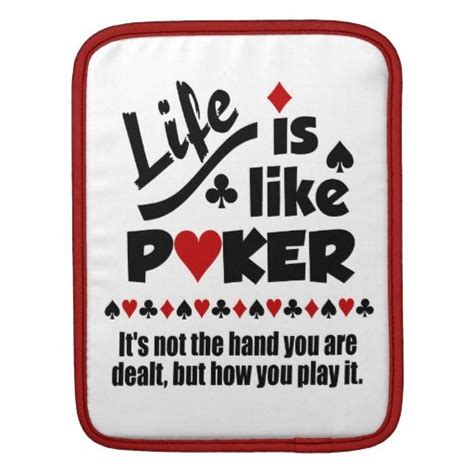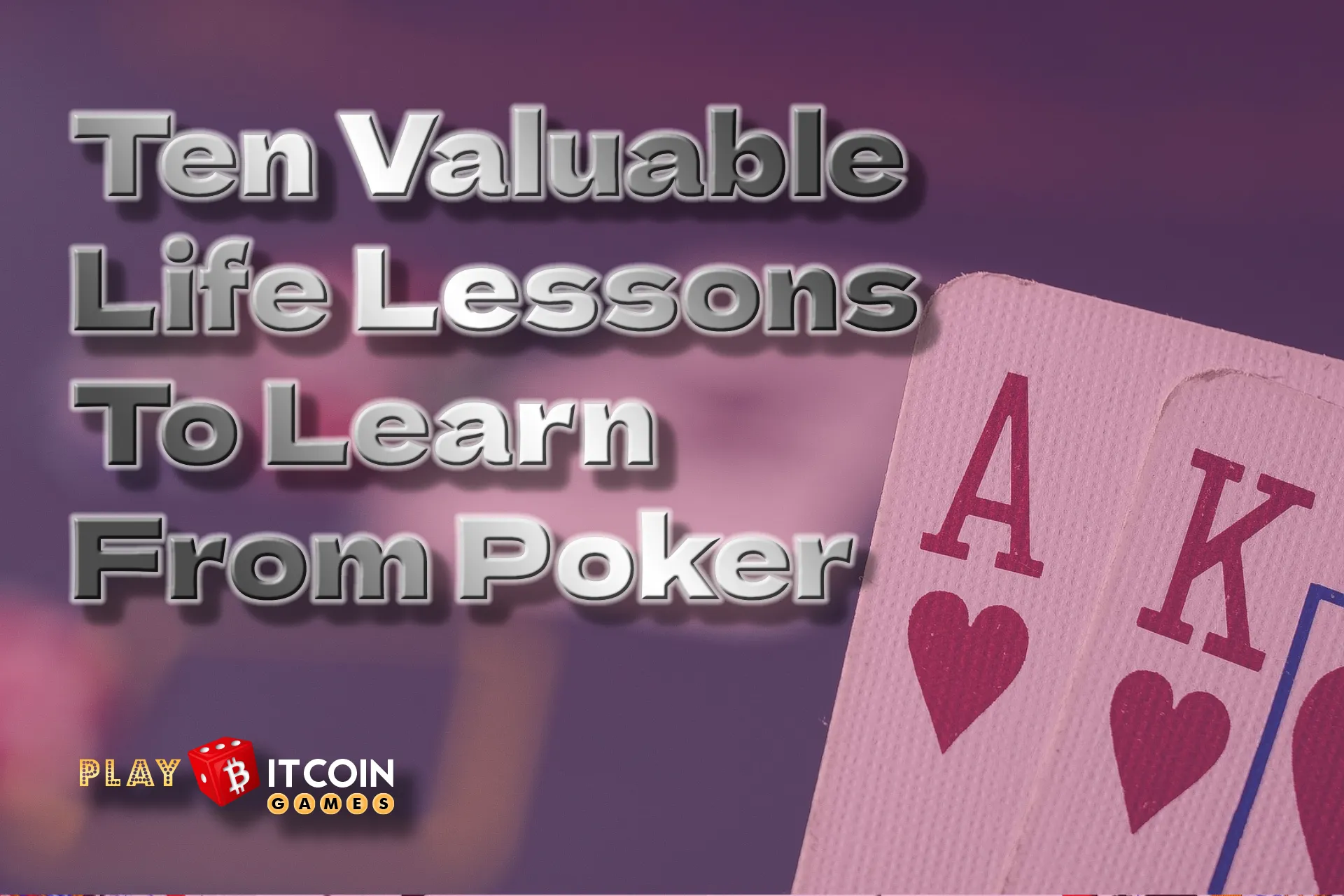Ten Valuable Life Lessons To Learn From Poker
Poker is much more than solely a game of chance. It’s a challenging and strategic card game that calls for talent, perseverance, and self-control. Did you realize, though, that you can use the knowledge you get from playing poker in real-world scenarios?
Poker can actually teach us several valuable life lessons. These life lessons educate us about making choices, taking calculated risks, being thoughtful, and being flexible—all critical abilities for overcoming obstacles in daily life.
Read on to learn how playing the well-known card game of poker can improve your character in all facets of your life, whether you’re an experienced player or a beginner.
1. Luck Is Just One Factor
Poker is sometimes perceived as a game of luck, yet this couldn’t be further from the truth. Although luck may play a minor role in the game, skill and strategy are actually of considerable value. Professional poker players are the best at understanding this and are aware that there is a lot more to the game than just luck.
Several aspects of our life may be improved by using this life lesson. While we can occasionally believe that chance is really the only thing stopping us from accomplishing our objectives, the reality reveals that there are a variety of other elements at play. Success in every industry requires tenacity, hard effort, and commitment.
We may increase our likelihood of being successful and accomplish our objectives by concentrating on these elements and pushing hard to develop our talents. Thus, the next time you feel down or irritated, keep in mind that luck is only one card from the deck and that everything is achievable with hard effort and devotion.

2. Risk vs. Reward
Poker, a game of skill and chance, is a great illustration of how crucial it is to balance the risks and rewards involved. To decide whether to gamble, fold, or raise, players must continuously assess the odds and take the worth of their hand into account. This decision-making process may teach us priceless life lessons that go well beyond the poker table.
We constantly choose between risk and reward in life. Whether deciding on a professional route, investing in the stock market, or starting a new relationship, in all these situations we must examine the possible rewards and downsides. Taking calculated risks can result in enormous benefits, but we must also be willing to deal with the repercussions if things do not go as planned.
The goal is to find an equilibrium between risk and reward. While we shouldn’t be frightened to take risks, we also need to be aware of the potential negative effects. Before making a choice, it’s critical to evaluate the issue, acquire all the data, and consider the pros and cons.
As we incorporate the principles we’ve learned playing poker into our daily lives, we become better decision-makers. We develop the ability to weigh the benefits and hazards of a situation and choose what is best for ourselves. We may attain our objectives and have satisfying lives by taking measured risks and being ready for the results.
3. Patience Is Key
Playing poker demands a great degree of patience in addition to having the appropriate cards in your hand. In truth, one of the most crucial traits a poker player can possess is patience.
The game entails waiting for the right opportunities to present themselves and seizing them when they come along. In a similar vein, we must be prepared to wait for the correct opportunities to present themselves in life and refrain from rushing into things.
“Good things come to those who wait.”
Popular Adage
Being patient in poker involves recognizing when to fold. A player may occasionally have a good hand, but if the chances of winning are not favorable, they must be prepared to fold and wait for a better opportunity.
This life lesson may also be applied to real-life situations. We may have a plan or a goal in mind, but it could be wiser to wait and be patient if the time is off or the situation is unfavorable. Rushing might result in blunders and wasted chances.
Better decision-making can also result from waiting and exercising patience. When we move quickly, we might not give ourselves enough time to think through all the possibilities or assess the potential outcomes. We may make wiser choices and prevent errors by exercising patience and awaiting for the ideal occasion.
4. Emotions Can Cloud Our Judgment
Poker is an intriguing game that needs not just strategy and ability, but also emotional control. Poker players must maintain discipline and avoid letting their emotions to show out and impact their decision-making process. This is an important lesson that applies to many aspects of life, not just poker.
Our emotions frequently lead us astray, prompting us to make lousy judgments that we later regret. We will be able to make better decisions and accomplish our goals more effectively if we learn to keep in check our emotions and apply logic to our thought process.
Whether coping with stressful circumstances in the workplace, personal connections, or any other facet of life, emotional stability and self-control are essential. So let’s learn to control our emotions rather than allowing them to control us by drawing your life lessons from the poker table.
5. Accepting Defeat
Poker is a game of both wins and losses, therefore players must be ready for facing either scenario. Having the appropriate attitude and being willing to gain knowledge from your errors are crucial while playing poker. This is a terrific life lesson that may be applied to real life as well.
We all suffer failures and disappointments in life. We all confront obstacles that might be challenging to overcome, whether they be failed projects, lost jobs, or strained relationships. Yet it’s important to realize that these failures are not the end of the world. Alternatively, they may be used as a tremendous learning opportunity.
When we experience defeat, it is natural to grow disheartened and quit trying. But, this is the period when we should be most committed to improving ourselves personally and learning from our errors. We may improve our ability to handle difficulties in the future and achieve more successes by embracing failure and using it as a teaching opportunity.
In poker, as in life, it is crucial to preserve a positive outlook and keep going forward even when faced with obstacles. By doing so, we may become stronger, smarter, and more resilient than before. Keep this in mind the next time you find yourself in a losing situation: it is not the end of the world. Instead, see tragedy as a chance to improve yourself by learning from it, growing, and changing.
6. Adaptability
Poker is unquestionably a game of adaptability, and players must be capable of rapidly assess and modify their strategy in light of the game’s continuously shifting circumstances. The greatest poker players are distinguished from the rest by their ability to quickly adapt, and this talent has great significance in our daily life as well.
Like poker, life can present us with unforeseen obstacles. Being adaptive and flexible in such situations might be the difference between success and failure.
It might be challenging to learn how to adapt and modify our strategy, whether in poker or in life. It takes a tremendous level of awareness, forethought, and the capacity to think and react quickly.
Yet once we get it down, it may revolutionize everything and present us with a wealth of new chances. Whether in our personal or professional life, being able to adapt may help us make the most of different circumstances.
Being adaptive can also help us remain resilient during times of hardship. It’s simple to get discouraged and lose focus when situations don’t go as planned. We may find fresh approaches to advance and maintain focus on our goals, though, by being adaptable and modifying our techniques. Flexibility is particularly crucial during crisis situations, when the capacity for adaptation might be the decisive factor in determining success or failure.
7. The Importance Of Focus
Poker is an activity that requires a lot of focused attention and concentration. In order to make the greatest selections possible, it demands that players be totally present and attentive. The same is true in life.
To be successful in any endeavor, we must be able to devote our whole attention to our objectives and the work at hand. This entails being aware of distractions and making an effort to get rid of them so that we can maintain focus.
Another of the most important life lessons that poker provides is the necessity of reading our rivals. In in order to prevail in the hand, we have to be able to recognize minute cues and signs that might reveal our opponents’ tactics and prospective future moves.
Several facets of life, including business and relationships, may benefit from having this ability to read people. We may make better judgments and handle circumstances more skillfully if we pay close attention to those around us and are capable of interpreting their behavior.
Poker may also teach us the value of maintaining our concentration on our objectives. Distractions in the game can be expensive and might result in bad judgment. The same holds true in real life. When we let ourselves become preoccupied with things that aren’t crucial or pertinent to our objectives, we risk losing focus on what is essential and missing out on chances to succeed.
In the end, poker is so much more than simply a game. It’s a great resource for imparting wisdom on life’s most crucial lessons, which may boost our fulfillment and achievement. We may enhance our overall effectiveness and accomplish our objectives with greater comfort and confidence by learning to concentrate, read others, and remain on course.
8. Knowing When To Quit
Poker, like many other elements of life, takes a certain amount of insight and analytical thought. Knowing when to give up is one of the most fundamental abilities a poker player must have. This entails being able to appraise the situation and decide if playing further is going to continue providing rewards or whether it is time to stop and walk away before losing more money.
Obviously, this life lesson is valid much beyond the realm of poker. We could come into circumstances in many aspects of our lives in which we are no longer getting the desired results.
Sometimes the most effective approach is to accept that it is necessary to let go and walk away, whether it is a career that is not satisfying, a personal connection that has ended, or a pastime which is no longer providing us joy.
This may prove to be a challenging choice to make, especially if we have devoted a great deal of time and effort to a specific endeavor. Yet continuing to invest more time, financial resources, or emotional energy into an endeavor that is not lucrative is unlikely to produce fruitful outcomes. In practice, it could just result in further disappointment and frustration.
In the end, realizing when to give up is a show of maturity and self-awareness rather than a sign of weakness. We give ourselves the opportunity to explore new avenues and chances by knowing when to give up and move on. We are able to direct our efforts to more valuable endeavors after releasing ourselves from the weight of a pointless pursuit. Thus, whether we’re at the poker table or dealing with a difficult circumstance in life, let’s keep in mind how significant it is to know when to give up.
9. The Importance Of Strategy
Poker, sometimes described as a match of strategy, demands players to assess the situation critically and make carefully calibrated judgments in order to triumph. Comparable to life, following a well-thought-out plan may help us accomplish our objectives and get through any challenges that may arise.
Without a plan, we run the risk of getting lost in the shuffle, losing money and time, and failing to provide the intended outcomes. The effectiveness of poker strategy can be applied to many parts of life, whether they are personal or professional.
Defining our objectives, evaluating the difficulties, and developing a thorough plan of action are the way to go. By doing this, we may successfully navigate through any obstacles that may emerge and raise our likelihood of succeeding. Discipline, patience, and a preparedness to adapt and shift as necessary are necessary for implementing effective solutions.
While we encounter numerous difficulties and hurdles in our everyday lives, the same ideas may be utilized. By creating and putting into practice a solid plan, we can make better decisions, use our resources more effectively, and eventually get the results we want. Therefore, let us all take some inspiration out of the poker mindset and start thinking our way to victory!
10. Honesty Is The Best Policy
Poker professionals are renowned for their tactical thinking and knack for reading their adversaries, but one quality that is sometimes disregarded is their persistent dedication to honesty. Lying and cheating are not only considered improper in the poker room, but they may also have major repercussions like getting disqualified or destroying the respect of other players.
But, the value of candor in poker goes well beyond the playing field. This is an important life lesson that may be used in all facets of life. Honesty is a crucial virtue that may assist us in developing lasting connections with other people. It enables us to gain their respect and confidence, which can be quite beneficial in both intimate and professional contexts.
On the contrary, lying and dishonesty may have serious repercussions. These may result in strained bonds, missed opportunities, and even damage to our own reputation. When we lie, we jeopardize not just the confidence of others but also our inner integrity and self-respect.
Hence, it is imperative that we are genuine with ourselves as well as with others, whether in poker or in life. We may develop deeper, more meaningful connections and achieve more success in all facets of our existence by upholding this ideal. Therefore, let’s all pledge to act with honesty and integrity and gain from it.
Conclusion
Poker has been played since the nineteenth century and has a long history of being linked to gambling and risk-taking. Yet, there’s a lot more to poker than just betting and hoping to win big. Poker may actually teach us important life lessons that are applicable to many facets of our lives.
We may improve as individuals and accomplish our objectives more successfully by playing the game and learning these lessons.
The next moment that you get down at the poker table, keep in mind the fact that you’re not simply taking part in a game of chance but also learning something that will help you in a variety of ways.


